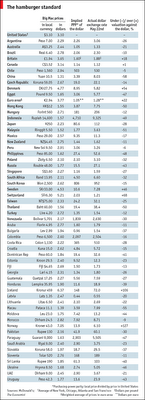Big Mac Index

今日看Sun Bin的文章"Indicators for exchange rate: is RMB under-valued?",讀到一個叫Big Mac Index的概念,原來好有趣。
話說經濟學上有個理論話:"the long-run equilibrium exchange rate of two currencies is the rate that equalizes the currencies' purchasing power."(Purchasing Power Parity (PPP), from Wikipedia)。即係話你揸住1蚊美金喺美國可以買到嘅野,當你來到香港兌換成港幣後,原則上你可以買到同樣嘅野,而這個結果係透過匯率的長期變動而達致。
Big Mac Index就是以Big Mac來量度一國貨幣的購買力(purchasing power)。散戶丙孤陋寡聞,原來這個Big Mac Index已經有20年歷史,最初由The Economist提出。
幽默的經濟學家用這個Index來衝量一國貨幣是偏高還是偏低。方法是這樣的:跟據2006年的數據,一個Big Mac在美國賣3.1美元,同樣的Big Mac在香港賣12港元。根據PPP理論,兩地Big Mac的價值應該相同,所以美元兌港元的兌換率應該是1美元兌(12/3.1=)3.87港元,但實情是1美元兌7.75港元,港元被大大地低估了!
看到這個有趣的表後,我有如下感想:
1. 真的有低估高估這回事嗎?我只看到窮國的貨幣都被「低估」了,富國的貨幣都被「高估」了。
2. Big Mac是一個brand,而且是一個帶有大美國主義的brand,這個Big Mac的價格與其背後所推銷的大美國主義的受歡迎程度肯定有關係。會否因為有些國家討厭美國而導致Big Mac的需求不振呢?點解唔用一些commodity如擦紙膠,原子筆或雞蛋來創立這個Index呢?
3. Big Mac Index面世後,最大的贏家肯定是老麥。

5 Comments:
mr. bobo introduced this index to me a long time ago...
ok, let's put the results of this index aside and focus on why "big mac":
if i remember correctly, the economist is a UK-based magazine. i am not sure why they would pick big mac as a proxy (or starbucks latte for that effect). they could have picked something more "UK" with that 3 characteristics - 1. easy to spot commodity (with consistently the same ingredients/raw materials), 2. widely available in the world, 3. priced by one corporation, when they started the index in 1980's. Maybe this shed some light on "點解唔用一些commodity如擦紙膠,原子筆或雞蛋來創立這個Index呢?"
Also, "會否因為有些國家討厭美國而導致Big Mac的需求不振呢?" - Within these 20 years, foreign countries' perception of the US had its own "ups and downs." Just like stock market has its own ups and downs in a short period of time - you can only see the bigger trend in a longer time span. It is the same as when you do financial modeling, you base your assumptions on "rational" terms as well. Even though it's not bullet-proof, as a "forecaster"/analyst, you can only assume certain things (with reasonable terms) in reaching a conclusion.
now back to the results of this index:
big mac index is merely a back-of-the-envelope calculation. to try to see the validity of this big mac test, a history of big mac results vs. actual currency fluctuations is needed. and this will take some time to dig... it will be interesting to see the index in 1996, the year before the 1997 asian currency crisis. it might just be the opposite of 2006's results.
ken.yong:
"1. easy to spot commodity (with consistently the same ingredients/raw materials), 2. widely available in the world..."我絕對同意。但對於"3. priced by one corporation...",我認為不大合理。如果我是麥記老闆,我在不同國家會有不同的定價策略。而且,作為一個品牌,Big Mac享有一定溢價,但這溢價在不同時空地域文化之下會有所不同。主宰Big Mac價格的因素實在太多了。所以我想起了一些沒有品牌且身處劇烈市場競爭的商品,如膠擦可能比較適合做類似的Index。
我進一步想起了"cost of living",似乎乎合制定類似index的條件。又好似幾啱,從歷史角度看,通常cost of living同國家財富成正比,但富不過三代,每個國家的財富都在不停oscillate。幾千年前,國與國之間的差別可以好大,今日大部分人都有得食有得著,富國同窮國cost of living的差距似乎在收窄。
但少部分最窮同最有錢的就越行越遠,PPP在這方面是有盲點的。
我仍然覺得Big Mac Index很有意思,但重點應該是要看這個Index的歷史走勢。
"priced by one corporation...",我認為不大合理。" - I think this is actually pretty vital when the economist picked big mac. my reasoning is: back in 1986, when information technology was not as advanced, as an economist, i would think, "where can i get the data with fair accuracy + fast?" you can think of eggs, eraser, etc., but those prices would take a lot of time to dig in many different countries. why didn't i just go to 麥記 as a "one-stop" shop?
first of all, i could get the data real fast (just one phone call). 麥記 would probably help me since it's free advertising and they already had that information anyway.
second, 麥記 would have already taken 主宰Big Mac價格的因素 into account when they priced it, including standard of living. Therefore, 麥記在不同國家會有不同的定價策略 has already been factored into it's big mac price. afterall, a big mac is a just big mac - 麥記 would only (and could only) price it as a commodity, even though it is a brand. it *might* fetch a slightly higher premium (or no premium at all, depends on countries: just like Wal-mart in Japan - they don't use Wal-mart, they retain Seiyuu).
that's exactly why i would have picked 麥記: cheap (cost effective) and fast access to fairly accurate information. afterall, the big mac index is only a "back-of-the-envelope" calculation.
絕對同意Big Mac Index只是一種"back-of-the-envelope"的玩意,重點是快同簡單。
不過睇完Starbucks的Tall Latte Index後,更令我相信這種以單一企業經營又帶有濃厚品牌味道的產品所創作的index是充滿bias的。跟據2004年的Tall Latte Index,大部分亞洲貨幣的低估程度並不如Big Mac Index所顯的那麼嚴重,人仔幾乎冇被低估,港幣同坡紙更被高估了。
不過,睇完呢個Tall Latte Index後,我又諗,Starbucks的議價能力超強,當年應該買入。
Personally, just from a consumer point of view, 麥記 is very different from Starbucks. I usually can get a coffee from other retailers for $1.00-$1.50, but Starbucks sell the same coffee for $3.00. Actually, Starbucks to me is a luxury brand. I do not (and could not afford to) drink Starbucks' coffee everyday. I always think twice before buying that iced mocha in Starsbuck.
However, the price of a hamburger is pretty much the same across all retailers. 麥記 doesn't quite fetch a premium. If I really want a hamburger, I can pretty much just go to any retailer without thinking twice.
Of course, this kind of quick analysis is always flawed and biased. I thought about the "diminishing return" theory again. How much would cost the Economist to use better alternative(s) to Big Mac vs. how accurate will this index become in predicting currencies?
Post a Comment
<< Home